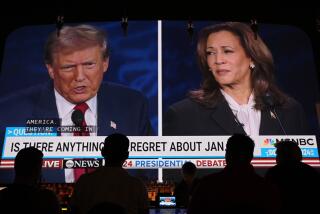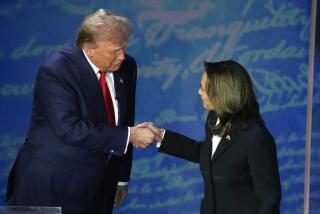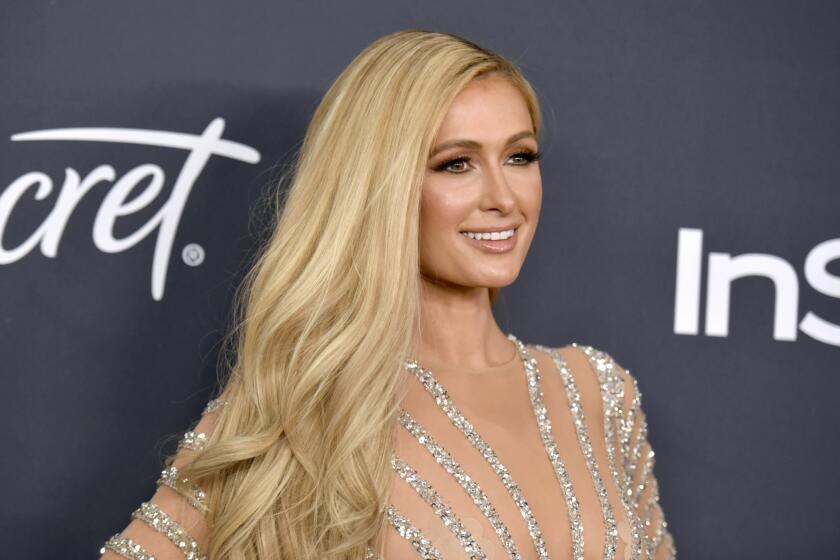Debate isn’t all talk; there’s ‘a little dance’
One was coiled and ready to spring. The other was typically languid. Even the candidates’ clothing choice reflected their mood: John McCain wore an intense red tie, Barack Obama picked out one that was a glacial shade of blue. Obama sat like a jazz musician on his chair, one heel hooked at an angle, while McCain sat as if he might leap up at any moment, or stood impatiently waiting for his turn to speak.
Two body language experts who watched Tuesday night’s debate said in interviews that they thought Obama was the clear winner. A third felt it was a draw.
“They both have different styles and are great,” said Lillian Glass, a Beverly Hills body language expert. She and the others agreed, however, that McCain showed a side of himself that was missing in the first presidential debate last month.
“It was like the Energizer Bunny had some batteries put in,” Glass said. “We have never seen McCain so warm and fuzzy and likable and dynamic. This was the best format for him. He would talk to the people, have direct eye contact. When he reached over to the petty officer and gave him a pat, it was quite touching. I think Sarah Palin has been a great influence on him.”
Patti Wood, an Atlanta-based body language expert, said it was too bad the rules called for the candidates to stay within separate zones on the stage and not engage with each other. As a result, she said, she was more struck by “paralanguage” than body language. Paralanguage refers to voice tone, speaking rate and other vocal nuances.
She said McCain was “much more positive and hopeful. His voice would go up and down. Obama started out being very even, not a lot of emotion, where he is typically very energetic and charismatic. In the second half, Obama was angrier, and one of the things we know about what works to persuade people in candidate situations is that anger has a stronger effect than happiness or joy.”
Obama had his moment of greatest emotion when, in answer to a question about healthcare, he said he regretted that when his mother was dying of ovarian cancer at 53, she had to spend her last days haggling with her insurance company. Said Glass: “When he talked about his mom, he was wonderful and passionate, he was really real. His hands were up, he was making sincere gestures.”
Both Wood and Glass thought that at other times, Obama seemed coached.
“In the first debate, he seemed like he paused and stuttered more,” Wood said. “When [moderator Tom] Brokaw would ask a question, he would almost jump out of his chair and walk powerfully and quickly toward Brokaw and answer quickly, with no pause. That showed he was more confident and sure of himself, and I am sure he was coached to answer as quickly as possible.”
But Glass, who thought the debate was a draw, said Obama seemed unnatural at times. “Somebody coached him and did not do him a favor,” she said. “When he talks about an issue he’s passionate about, his gestures are fluid and real, but other times, he took his index finger and clasped it to his thumb, and it’s phony, it’s not real.”
She also thought his inflection might be a turn-off to some voters. “He’d say, ‘Pahk-ee-stahn,’ or ‘Tolly-bahn.’ You need to say Pakistan and Taliban like everyone else.”
Karen Bradley, a University of Maryland dance professor and expert on body movement, saw the event, perhaps not surprisingly, as “a little dance.”
“Sen. McCain’s way is to dig in his heels and be very solid and very direct. He did that a lot, but then he also wandered around a bit. When he did that, he toddled and he looked a little old and unsteady on his feet, which is in direct contrast to how he comes across to his supporters. He did better when he stood his ground and spoke directly,” she said.
Obama, said Bradley, “had a tendency to wander around and be comprehensive. He had a lot of ideas coming out of him, and tonight he seemed to be unsure, a little hesitant.” She thought Obama hit his mark in an answer to a question about Israel. “He looked the guy right in the eye and the guy nodded. That was a strong answer.”
She also thought that their facial expressions gave them away. “Sen. Obama seems to go a little blank, his face opens up and then when he gets clear about an idea, his face gets very focused.”
Wood, who said that a debate is won in the first 15 minutes and lost in the last two, thought Obama closed on a higher note than McCain.
“McCain was very strong at the beginning, but the fact that it lasted an hour and a half worked against him,” she said. “You could tell he lost energy. If people watched until the end, Obama ended really strong.”
--
More to Read
Get the L.A. Times Politics newsletter
Deeply reported insights into legislation, politics and policy from Sacramento, Washington and beyond. In your inbox three times per week.
You may occasionally receive promotional content from the Los Angeles Times.











